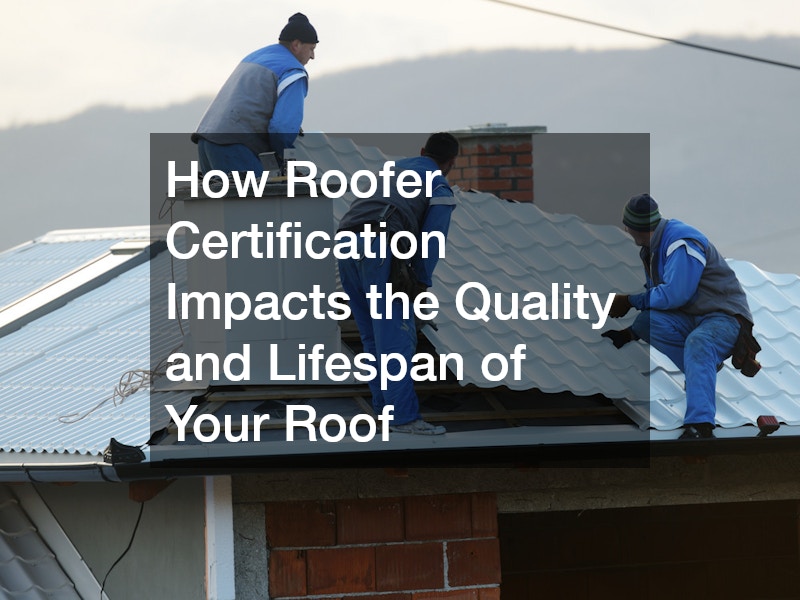Disclaimer: Benro Properties. This site provides home improvement content for informational purposes only.
Key Takeaways
-
Certified roofers have specialized training that ensures proper installation and long-lasting results.
-
Certification goes beyond licensing, proving advanced knowledge and verified skills.
-
Hiring a certified roofing contractor protects your warranty eligibility and can unlock extended coverage.
-
Certified installers follow strict building codes, reducing the risk of failed inspections or fines.
-
Proper techniques used by certified roofers directly extend the lifespan of your roof.
-
Certified roofing companies carry insurance, protecting homeowners from liability.
-
Verifying certification helps avoid scams, poor workmanship, and voided warranties.

Your roof is the single most important shield your home has against the elements. It protects your family, belongings, and the structure itself from water, wind, heat, and ice. Yet, the quality and lifespan of your roof don’t just depend on the materials you choose; they hinge heavily on the skill and training of the people installing it. This is where certified roofers make all the difference.
A certified roofing contractor has undergone specialized training, passed rigorous assessments, and demonstrated knowledge of installation techniques that meet or exceed industry and manufacturer standards. That certification directly translates to fewer problems, longer roof life, and stronger protection for your investment. Understanding how roofer certification impacts your roof will help you make informed decisions and avoid costly mistakes when hiring a roofing professional.
Understanding Roofer Certification
Not all roofers are created equal, and the terms “licensed” and “certified” are often confused.
-
Licensing:
-
Typically issued by a state or local authority.
-
Proves that the roofing company meets minimum requirements to operate legally.
-
Focuses more on business registration, insurance, and safety basics rather than workmanship.
-
-
Certification:
-
Usually granted by roofing manufacturers or professional associations.
-
Requires contractors to complete specialized training in installation methods, product knowledge, and safety standards.
-
Demonstrates that the roofer has mastered best practices and can meet high performance expectations.
-
Types of Certification Homeowners May Encounter:
-
Manufacturer Certifications: For instance, designations like “GAF Master Elite” or “Owens Corning Platinum Preferred Contractor.” These mean the roofer is trusted by the manufacturer to properly install their products.
-
Industry Certifications: Organizations like the NRCA (National Roofing Contractors Association) provide certifications that emphasize technical skills and safety standards.
-
Regional Programs: Some states or municipalities require contractors to pass additional courses for certain roofing systems, such as slate, tile, or flat roofing.
Hiring a certified roofer isn’t just about a piece of paper—it’s about knowing the person on your roof has proven their ability to deliver long-lasting, code-compliant results.
Why Certification Matters in Roofing Projects
Every roof replacement or repair is an investment, and the workmanship can either make that investment last for decades or fail prematurely. Certified roofers bring a higher level of expertise to the table.
-
Better Workmanship: Certification requires roofers to use precise installation methods. This helps avoid issues like misaligned shingles, improper nail placement, or inadequate sealing.
-
Advanced Knowledge: A certified roofing contractor understands the latest roofing technologies, ventilation strategies, and installation systems.
-
Fewer Mistakes: Uncertified roofers are more likely to cut corners, skip steps, or misunderstand manufacturer specifications, which can lead to leaks or structural damage.
-
Commitment to Education: Many certification programs require continuing education, which means certified roofers are always up-to-date on new materials, code changes, and installation techniques.
Hiring someone without certification might save you a small amount upfront, but it increases the risk of costly repairs and replacements down the line.
The Link Between Certification and Roof Quality
A roofing system is more than just shingles—it’s a layered defense made up of underlayment, decking, ventilation, flashing, and insulation. Certified roofing contractors are trained to see how each part connects, and they know how to ensure every layer performs at its best.
-
Installation Accuracy:
-
Certified installers follow exact nail spacing and depth requirements to maximize shingle durability and wind resistance.
-
They ensure water-shedding overlaps are correctly aligned, reducing the risk of leaks.
-
Proper flashing installation around chimneys, vents, and skylights prevents weak points.
-
-
Material Selection and Use:
-
Certified roofers often gain access to higher-grade materials and complete roofing systems not available to uncertified contractors.
-
These integrated systems—shingles, underlayments, ridge vents, and sealants—are designed to work together, offering stronger overall protection.
-
-
Attention to Ventilation:
-
Adequate ventilation is crucial to prevent attic heat buildup, which can shorten shingle lifespan.
-
Certified roofing companies design balanced intake and exhaust systems that regulate temperature and humidity, protecting both the roof and interior air quality.
-
Poor workmanship can shorten the life of even the highest-quality roofing materials. A certified roofer ensures that the quality of the installation matches the quality of the products.
How Certification Extends the Lifespan of Your Roof
A well-installed roof can last 25–50 years depending on material, but poor installation may cut that life in half. Certified roofing contractors follow procedures that maximize durability.
How Certified Roofers Extend Roof Life:
-
Proper Underlayment Installation: Protects decking from moisture penetration, even if shingles become damaged.
-
Correct Fastener Placement: Prevents shingles from lifting in high winds and maintains manufacturer-rated wind resistance.
-
Expert Flashing Techniques: Ensures water doesn’t infiltrate vulnerable areas like valleys, chimneys, and skylights.
-
Optimized Ventilation: Reduces risks of ice dams in winter and heat damage in summer.
-
Moisture and Mold Prevention: Certified contractors know how to design systems that prevent condensation and rot within attic spaces.
For homeowners, this translates to a roof that reaches its full expected lifespan, saving tens of thousands of dollars over time.
Certification and Manufacturer Warranties
One of the most overlooked benefits of hiring certified roofers is the impact on warranties.
-
Standard Coverage: If an uncertified roofer installs your roof, most manufacturers only cover defects in materials, not labor or installation errors.
-
Enhanced Coverage with Certified Installers:
-
Extended warranty terms, sometimes up to 50 years.
-
Coverage that includes both materials and labor.
-
Transferable warranties, which can increase resale value.
-
Manufacturers know their products perform best when installed by contractors who have been trained and tested. By hiring a certified roofing company, you not only protect your roof but also safeguard your warranty rights.
Certification and Building Code Compliance
Certified roofers don’t just install shingles—they ensure your roof meets or exceeds building codes.
-
Compliance Benefits:
-
Projects pass inspection the first time, avoiding costly delays.
-
Proper compliance reduces liability for both the roofer and the homeowner.
-
Ensures the roof contributes to the overall safety and efficiency of the home.
-
-
Risks of Uncertified Work:
-
Failed inspections that can halt a project mid-way.
-
Fines or penalties for non-compliance.
-
Problems when selling your home if the roof is not up to code.
-
Certification guarantees that your roof is built to professional standards and will stand up to local regulations.
Insurance, Liability, and Certification
Roofing is dangerous work. Hiring uncertified or uninsured contractors puts you at risk of financial and legal trouble. Certified roofing companies help reduce these risks.
-
Insurance Coverage:
-
Certified roofers typically carry general liability insurance to cover accidental property damage.
-
Workers’ compensation insurance ensures homeowners aren’t liable for injuries that occur on-site.
-
-
Impact on Claims:
-
Insurance providers are more likely to honor storm damage claims when the roof was installed by a certified roofer.
-
Poor installation by an uncertified contractor can lead to denied claims or reduced payouts.
-
A certified roofing contractor doesn’t just protect your home—they protect you financially as well.
How to Verify a Roofer’s Certification
Not every contractor who claims to be certified actually is. Homeowners need to know how to verify credentials before signing a contract.
Steps to Confirm Certification:
-
Ask for Certificates: A legitimate certified roofer will gladly show proof of credentials.
-
Check Manufacturer Websites: Many manufacturers maintain online directories of certified contractors.
-
Verify with State Boards: Ensure the roofer also meets licensing and insurance requirements.
-
Review Past Projects: Ask for references and photos of similar work.
Red Flags to Watch Out For:
-
Contractors unwilling to provide documentation.
-
Extremely low bids compared to other roofing companies.
-
Lack of reviews, references, or an established business address.
Taking these precautions ensures you’re truly working with a certified roofing professional.
Cost vs. Value of Hiring Certified Roofers
It’s no secret that certified roofing contractors often charge more than uncertified workers. But what you gain in return is significantly more valuable.
-
Upfront Costs: Certified companies invest in training, quality materials, and insurance, which may slightly raise project estimates.
-
Long-Term Value:
-
Fewer repair bills over time.
-
Roof that reaches or exceeds its expected lifespan.
-
Warranty coverage that saves thousands if something fails.
-
Higher resale value because buyers trust certified installation.
-
Think of it like this: paying more for a certified installer now is cheaper than paying for premature roof replacement in 10 years.
When it comes to protecting your home, hiring certified roofers is one of the most important decisions you can make. Certification ensures proper installation, compliance with building codes, eligibility for extended warranties, and protection from liability issues. Most importantly, it directly impacts the quality and lifespan of your roof.
If you’re planning a roofing project, always verify that your contractor is certified. The peace of mind, financial protection, and long-term durability you gain are well worth the investment. A certified roofing contractor doesn’t just install a roof—they provide lasting protection for your home and your future.
